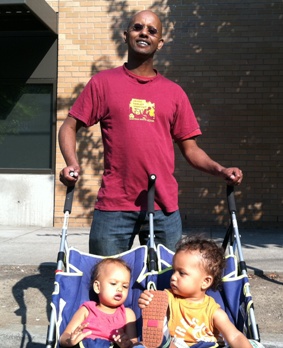 Kayse Jama with his 17-month-old twins Saharla and Sahan Kayse Jama with his 17-month-old twins Saharla and Sahan |
When scientists want to look at the structure of cells, they need the help of a powerful, magnifying lens. When we want to look at how our social structures create injustice, we might need the help of an equity lens.
That's the argument behind plans to create an Office of Equity for the City of Portland. Advocates say that we need a dedicated staff to examine city policies and practices through the lens of what is fair and just to everyone. Other cities, including our neighbors Eugene and Seattle, already have done so.
"The disparities we see in the community are appalling," said City Commissioner Amanda Fritz. "We need to make our whole system better to change those outcomes."
Until advocates packed the City Council meeting Aug. 31, the plan had met with a lukewarm reception. Willamette Week and The Oregonian aired the views of critics who said that the office had no concrete mission, and was unnecessary because it duplicated the work of the Human Relations Commission. But Fritz says the critics are largely those who know and care least about the issues.
"The community members most affected have asked us to change the way the city does business, so it's interesting that others who have not been involved say we shouldn't do this," she says. " It's belittling."
The proposal is heading to Portland City Council again on Sept. 21, and a vote is expected.
Fritz says she always planned to meld the two bureaus, and that the mission is clear: the Office of Equity will evaluate the City's operations and policies, and develop a set of best practices to ensure fairness for all.
That's not the case now, she says, pointing to research that shows Black and Latino Portlanders, for example, and also people with disabilities, fare much worse than other citizens in important areas, such as housing, jobs, education, health and career advancement. The playing field is simply not level.
Many advocates agree, and turned out to the Aug. 31 city council meeting to demonstrate that support. The Urban League, the Center for Intercultural Organizing, and Upstream Health are just three organizations that say Portland needs a dedicated Office of Equity.
"Portland should have one," says Marcus Mundy, president of the Urban League of Portland. "Because everything that has been done to date has not affected disparities. It will help by making sure equity is infused into every city process, whether it's policy, contracting, sharing of resources: any way that the city can be better. At its root equity means fairness, and as a citizen and a taxpayer of this city that's what I want: Fairness. "
Raquel Bournhonesque, co-director of Upstream Public Health, said that low-income children, for example, are twice as likely to have untreated tooth decay and 30 percent likely to have access to dental care. The City already partners with the County, for example on the Food Policy Council, to address health disparities connected to food, she says. With an Office of Equity, it could do more.
"The Office of Equity could help raise awareness about the severe problem of oral health disparities, and help disseminate inequity data in general," she says. "It could help coordinate and support county public health and school based initiatives ... around health inequities."
"It could also raise awareness about the significant disparities in transportation investments between East and West Portland. The Equity Office could work toward more equitable, healthy transportation options particularly for low-income communities and communities of color."
Kayse Jama, executive director of the Center for Intercultural Organizing, says, "It is about accountability and building a baseline and metrics so we can measure our success. You can't do equity by chance, it has to be by design."
Jama compares the city to a house that has been built for one family but then must accommodate others. "When this house was built, they didn't forsee who would be living in the house. We now have 22 percent people of color in Multnomah County. It's time we came together and really fixed up that house."
In the past efforts to ensure fairness have been piecemeal, he says.
"It will save us money in the long term; it's smart; but it's also a moral issue. We have to make sure the city works for all – not some—but all. "
Fritz says most major institutions have invested in promoting equity because promoting fairness is good for everyone.
"A lot of private companies are also working on equity and diversity," she notes. "They know it matters for our economy. So I think the city will benefit from some best practices that have already been established."
"It is a very research-based approach," she says. "It's not just throwing a bunch of money at the problem."
So what about the argument that we can't afford to spend the money. Fritz maintains the Office's budget, of $1.1 million, is well worth it.
"Council just voted to spend $2 million on a bike rental program downtown," she says.
"So it's really not much money, when you look at other things we prioritize."
The Skanner News editor, Lisa Loving, talked to Portland City Commissioner Amanda Fritz , Kayse Jama and Anne Naito-Campbell, about Portland's Office of Equity on KBOO radio. Listen here.






















































































































































































































































































































